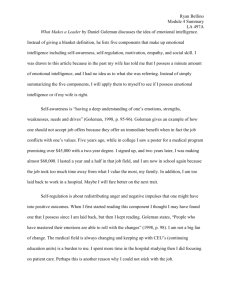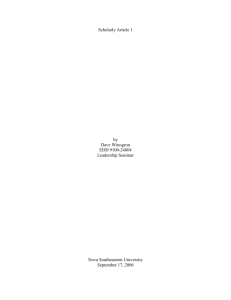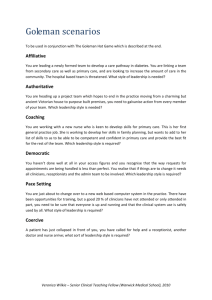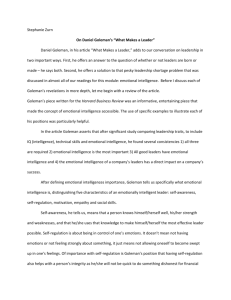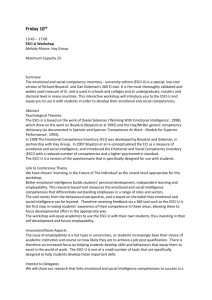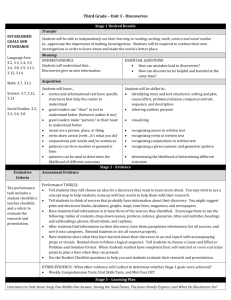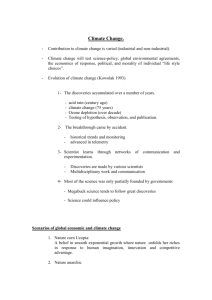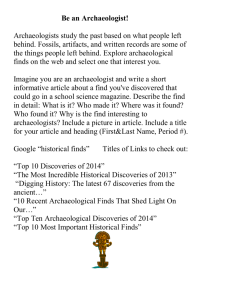Leadership - Jacob Pifer
advertisement
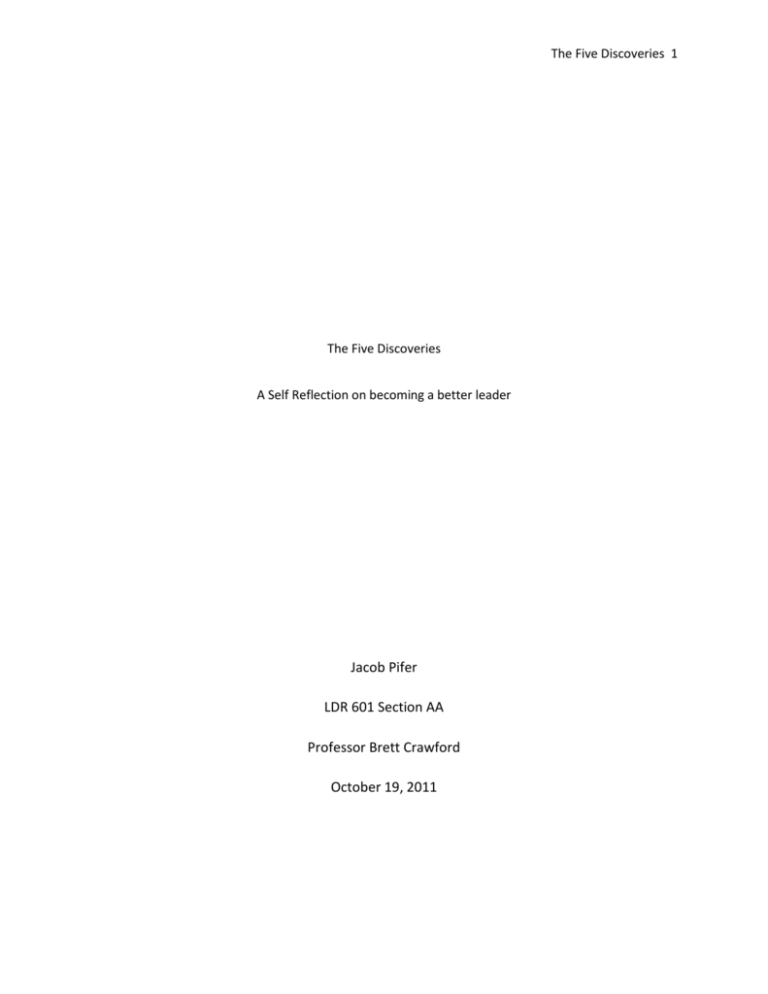
The Five Discoveries 1 The Five Discoveries A Self Reflection on becoming a better leader Jacob Pifer LDR 601 Section AA Professor Brett Crawford October 19, 2011 The Five Discoveries 2 Successful leaders recognize the need for change and embrace it. “Those who successfully change in sustainable ways cycle through the five basic discoveries” (Goleman, Boyatzis, & McKee, 2002). While completing the required reading, I found this chapter of Daniel Goleman’s Book, Primal Leadership, the most interesting. I know there are changes that are needed to reach my goals. The five basic discoveries discussed by Goleman helped me to realize just how much I had to change to become a better leader. At the expense of embarrassing myself, I will use this assignment to examine my own discoveries and their impact on both my personal and professional life. The first discovery is “My Ideal Self – Who do I want to be?” (Goleman, Boyatzis, & McKee, 2002). I looked at this question in both general and specific terms. Generally I want to be a person with integrity, who can be relied upon to get the job done. I want to have sound moral character, good family values, and compassion for others. In my professional life I want to be successful and knowledgable. I enjoy teaching others and hope to continue to be an instructor in various skill areas related to Law Enforcement. Although none of these ideals are very specific, it is a general outline for the person I strive to be. On a more specific level I want to become a great parent to my daughter. I want to teach her how to be a good citizen in our community; and to treat others with respect and dignity. I want to have a loving and entertaining relationship with my wife. If you were to meet her, you would understand the entertaining aspect of her personality. In my profession I see myself becoming a top supervisor at my agency. After gaining experience in this atmosphere I would like to become the Sheriff or a Police Chief of a middle sized police agency. I want to be The Five Discoveries 3 respected as a leader and produce a work environment that encourages the employees to learn and work to their potential. These goals and ideals that I see for myself are just the beginning. These ideals are always changing and I know I have found a good one when I am “Feeling suddenly passionate about the possibilities my life holds” (Goleman, Boyatzis, & McKee, 2002) . The second discovery is “My real self- Who am I?” (Goleman, Boyatzis, & McKee, 2002). When examining this discovery I came to a conclusion. My perception of myself was based largely from what I thought others wanted me to be. This was quite the wake-up call and helped bring me back to a sense of reality. Henry Cloud discusses this perception of an alternate reality and self-reflection. He states that the quickest way to fail is by “spending time in some alternate universe that does not exist to make the one that we are living in feel better” (Cloud, 2006). I thought others wanted me to be strong and courageous. I thought they wanted me to be the go-to-guy in case of a crisis. Many times people would come to me with their problems and I would talk to them and listen. I truly thought this was what others wanted me to be. In reality I may be courageous at times, but I am very scared when it comes time to act. I am afraid of failure. I am afraid of how I will be perceived if I make a mistake. Will others think I am incompetent? In my professional life I really had to dig deep to find some answers. When I began my Law Enforcement career, I was energetic, enthused, and eager to come to work every day. I didn’t want to miss a single incident and actually enjoyed going to work more than spending time with my friends. Slowly this enthusiasm has faded and has been replaced with a jaded outlook on society as a whole. One example of this outlook happened a couple of years ago. I The Five Discoveries 4 was sent to a report of someone shooting at a coon hunter’s dogs. Being a dog lover myself, this upset me a little bit. When I spoke with the owner of the dogs he took me to the area where his dogs were shot at. He stated one of his dogs was still on the property and he couldn’t find him. This area was private property and we had to get permission from the land owner to enter onto his property. When we spoke with the landowner he was adamant that no one enter his property and he was upset that the victim’s dogs had even been on his property. When he refused to allow the victim to retrieve his dog, I asked him why he was being pigheaded about the issue. At the time I never thought about how he was feeling, only that my own opinions gave me a jaded view of this man. He in return filed a formal complaint on me, and I had to explain my actions to my supervisor. I know that this outlook is negative and identifying its characteristics is hopefully the beginning of changing this perception. I realize I have many strengths and weaknesses that I must address. This is also part of the discovery of who I am. Andrew Dubrin talks about the different Traits and Characteristics of Leaders in his book, Leadership: Research findings, practice and Skills. Of the eight Characteristics discussed beginning on page 34 of his text, I believe my strengths lie in five of the eight traits. I am a hard worker who likes to lead by example. I am trustworthy, and authentic in both my words and actions. I try to be as humble as I can be, focusing on strengths rather than being boastful. I am assertive when needed and can find the humor in almost anything (Dubrin, 2010). When it comes to weaknesses, it is also very difficult to address. I have yet to talk to anyone who enjoys discussing their weaknesses, but as a leader, this is an area that must be The Five Discoveries 5 recognized so that change may progress. I am not confident in a lot of my abilities as a leader. I believe a lot of this comes from my fear of failure, and what others may perceive of me. There are certain situations that I am extremely confident of my abilities, but those are outnumbered by the times I second guess myself. Within my profession I am very extroverted. I am able to speak with other law enforcement professionals with ease, and approach department heads with little to no anxiety. When it comes to personal situations; however I am more reserved and do not approach many people I do not know. As discussed earlier, another of my weaknesses is trying to be enthusiastic and optimistic. Because of all the negative things I see from society, I am not as enthused as I should be, nor do I have an optimistic view that this will change any time soon (Dubrin, 2010). The beginning of changing my behavior is recognizing where my strengths and weaknesses are within my leadership capabilities. The third discovery is “My Learning Agenda” (Goleman, Boyatzis, & McKee, 2002). This discovery is based largely on growing my strengths as well as working to bring my weaknesses up to strengths. I have already begun to start this process, simply by returning to school to obtain a Master’s Degree. I continually ask myself, “Am I taking these courses just to get a grade and a piece of paper or do I truly want to become a better person and a more effective leader?” In every class I have taken thus far, I have discovered something new, and have integrated this learning into my life. I have realized that my assertiveness is needed in times of crisis, but not necessarily when trying to motivate others. I continue to be humble, but realize that I need to project my strengths to further myself in my career. I have set several goals for myself even prior to taking this course that have helped to develop these strengths and The Five Discoveries 6 weaknesses. I try and take time out to talk with people I do not know. Often times this means someone from a different economic background, or religious belief. Many times this has opened my eyes to just how little I knew of others and their environments. It has helped to give me a better appreciation of others and I have gained some valuable experience in approaching new people. By building these relationships, I am also increasing my selfconfidence, and am more enthused everyday about what obstacles life will present. Goleman discusses that we must set goals for ourselves in order to effect change as leaders. By setting these goals and solidifying my learning agenda I can strive for my ideal self. By setting goals, I am able to set in concrete a guideline for that improvement (Goleman, Boyatzis, & McKee, 2002). I have set some goals for myself in my professional life that I feel are attainable in the next three to four years. Write a grant for federal or private funding for an item for my department. By doing this I can have one of my supervisors critique it and we can work together to get the funding necessary to do our jobs effectively. Become a field training officer for my department. Teaching others is very gratifying. I would like to help teach new officers how to do their job effectively. This is largely a leadership role and helps to develop other leadership traits. Propose and implement new streams of revenue for law enforcement. The Five Discoveries 7 We currently do not have any items of revenue for our department other than tax base. Fines for tickets go to the court house and libraries. There are other ways to create revenue that state laws allows for law enforcement departments to do. These could be an alternative to layoffs in the future. Approach other supervisors and gain their perspectives on effective leaders. I want to speak with other Chiefs, and supervisors about what they feel an effective leader should be. This is a short list, but one that is attainable for the future. Goleman states, “Perhaps the greatest mistake that people make when setting goals is committing themselves to activities that are difficult to do in their current lives and work styles” (Goleman, Boyatzis, & McKee, 2002). By making these goals attainable, I feel I can be successful in completing them. The final two discoveries are in the beginning stages for me. Obviously; I cannot give a final report on them at this time, but I will be able to look back at this assignment to make sure I am on the right track. The fourth discovery, “Experimenting with and practicing new behaviors, thoughts, and feelings to the point of mastery,” seems reasonable at first glance (Goleman, Boyatzis, & McKee, 2002). In reality, people tend to lose their cool from time to time and are unable to completely control these thoughts and feelings. “The ability to control your thinking when your emotions are enflamed is huge for success” (Cloud, 2006). By recognizing the onset of strong emotions, I will be better able to control my behavior coming from those emotions. I have begun the process of changing my thoughts and feelings. I have never been The Five Discoveries 8 one to strictly act out of emotion, but it has been known to happen from time to time. By practicing these new behaviors and thoughts, I also realize that I must be prepared for setbacks. I must be able to lose well and move on. Cloud states, “We all lose. Losing is a reality that everyone encounters, and therefore we need to learn how to negotiate it” (Cloud, 2006). By learning to negotiate my failures, and subside my fear of losing, I can learn from my mistakes and not repeat them. The fifth and final discovery discussed by Goleman is “Develop supportive and trusting relationships that make change possible” (Goleman, Boyatzis, & McKee, 2002). I have already begun this process by forming relationships with members of my department, as well as attorneys and court officials. “A leader with good relationship management skills would continue to enlarge his or her network of people to win support when support is needed. A leader with these skills is more likely to be sought out by these networks for new career opportunities” (Dubrin, 2010). By building the relationships that I have with the Sheriff, the Undersheriff, Circuit Court Judges, Prosecutors, Defense Attorneys, Chiefs, Public Safety Directors, and University presidents; I am striving for the support needed when the next big career opportunity presents itself. Examinig the five discoveries presented by Goleman was very difficult, but also very eye opening. My self awareness has been improved greatly from this assignment. When I read the instructions for the assignment, I was at a loss for a topic. Suddenly, the chart and text from Goleman struck a charge in my brain and I couldn’t stop thinking about it. I realize the process of becoming a resonant leader is a long one, but I also realize that the rewards are priceless. The Five Discoveries 9 “Ideally, progression occurs through a moment of discovery that provokes not just awareness, but also a sense of urgency. These discoveries are the process that enables leadership mastery” (Goleman, Boyatzis, & McKee, 2002). The Five Discoveries 10 Bibliography Cloud, H. (2006). Integrity: the courage to meet the demands of reality. New York, NY: HarperCollins. Dubrin, A. J. (2010). Leadership: Research Findings, Practice, and Skills Sixth Edition. Mason, OH: SouthWestern Cengage Learning. Goleman, D., Boyatzis, R., & McKee, A. (2002). Primal Leadership: Realizing the power of Emotional Intelligence. Boston, MA: Harvard Business School Publishing.
